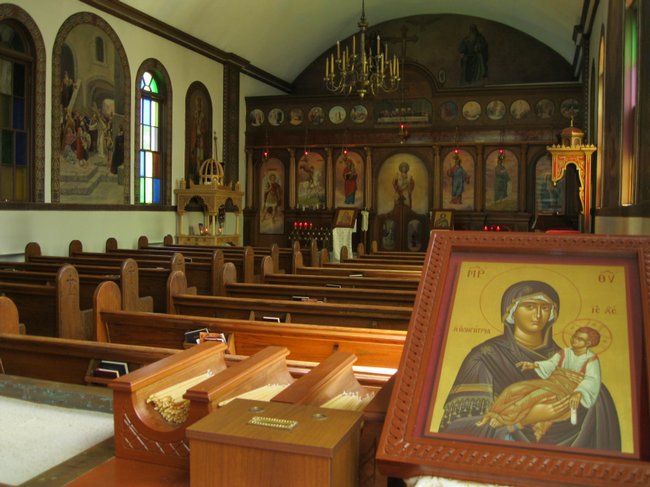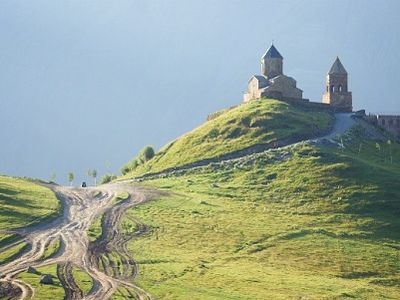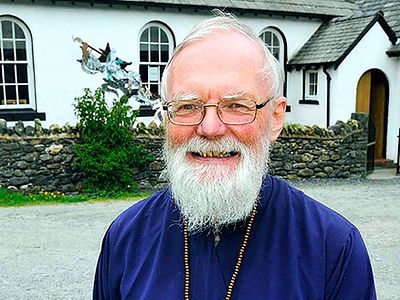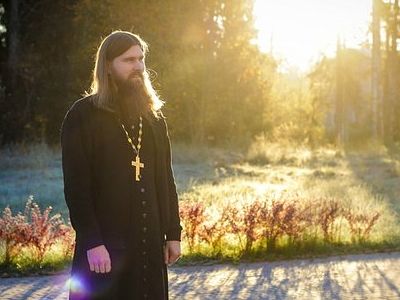July 19, 2015

The Greek Orthodox faith is at once similar and dissimilar to me. It’s similar in its teaching of basic Christian values but dissimilar in its origins and ancient historical perspective. After months of trying to match my schedule with his, I was finally able to talk to Father Theodore C. Roupas, presiding priest of St. George Greek Orthodox Church in Schenectady, NY, where he answered some of my questions about faith, doctrine, and his personal history.
Towne: What relation is the Greek Orthodox Church to the Eastern Orthodox Church?
Roupas: Whenever we hear the word Greek Orthodox Church or Eastern Orthodox Church they are interchangeable, they are one and the same. When we refer to the Eastern Orthodox Church, we refer to others, such as, the Greek Orthodox Church, the Romanian Orthodox Church, the Bulgarian Orthodox Church, the Chinese Orthodox Church, the Korean Orthodox Church, the Japanese Orthodox Church.
Towne: Tell me a little of the history of St. George, its founding and current history.
Roupas: In a nutshell, St. George was founded in 1914. We just celebrated our 100 years, our centennial. In fact we just celebrated our Centennial Gala this past April. This parish has been here 100 years in Schenectady and we are pretty well known; we are located right near city hall. We are known for, not only for our Greek festivals, which are always held the weekend after Labor Day in September. It’s a three day event: Friday, Saturday and Sunday.
But we are known, not just for festivals, but also for our faith. We are known for being a mixed congregation. Everybody in our parish that happens to be Greek, ends up marrying another Greek person. We have people here who are Greek, but are also American or Romanian. Different people come here from all walks of life. We have had different people converting to orthodoxy, so the makeup of the parish as definitely changed. It once used to be an immigrant community, so to speak. The parish was used, not just for a place of worship, but also for a place of reliability, connections, to help Greek families get established here in the United States when they came over from Greece. It was known for that and today we are known for our services and our festivals serve as outreach. We are involved in the city mission here in Schenectady and we do a lot of work with them. We have brought our youth there to expose them to what the city mission is and does.
You have a ladies organization here called the Ladies Philoptochos Society, it’s made up of a number of wonderful, young, committed women…They are a great group of ladies who do a lot of work in terms of raising funds and donating to the city mission. We also have an organization under the Ladies Philoptochos Society, that is involved in offering free meals, free lunches, at the salvation army soup kitchen on Lafayette Street here in downtown Schenectady.
Towne: How did you come to pastor St. George?
Roupas: I was asked by the archdiocese to transfer up to St. George Greek Orthodox Church in Schenectady, back in the summer of 2013. I was serving at that time at Annunciation Greek Orthodox Church in Nassau, Bahamas in the Caribbean. I was there for almost three years until the Archbishop asked me to come north. So I traded one super warm paradise for an extremely cold paradise. We still consider it beautiful up here because it’s good to have four seasons. It’s great to see snow, it’s great to see the fall foliage. So, I’m very happy up here, and in the Orthodox Church we are married. As clergy, we are permitted to be married as long as we are married before we were ordained. My wife is not Greek for example, she is from the country of Romania. She is Romanian Orthodox.
Towne: What role you like to see St. George play in the coming years?
Roupas: I’ve only been here for two years, almost two years; two years this October. I would like to see the parish continue to focus on what is most important, and that is our spirituality and when we talk about our spirituality we are talking about our relationship with God. A relationship with God can only take place when people focus on living a life of humility; which involves, for example, coming to the Holy Confession. So, this whole concept of spirituality and be very key. As a parish we don’t intend to be known for our cultural events. Otherwise we would be known as a community; we are not community, we are a parish family. A parish family is recognized and sensed according to the degree of humility that it has, according to a parishioners relationship with their Lord and Savior.
Towne: What motivated you to become a priest and what keeps you going?
Roupas: What motivated me to become a priest? Good question. I never really wanted to become a priest. (Laughs)That’s the story…
No, I was never a churchgoer. I was raised in a Greek-American family down in North Carolina and I was always the type of kid who was dragged to church by his parents or grandparents because that’s what a good son or grandson did to please his parents on a Sunday morning. I got up, dressed and went to church and coffee hour. And as I got older and my teenage years I was frustrated with the whole concept of going to church. So, as a result, I first stopped going to church and when they had the Sunday school graduation ceremony my senior year of high school, my parents wanted me to go to receive my Orthodox study Bible I didn’t want to go and receive it, so I told my parents that they could just go and receive it on my behalf. And that disappointed them.
And then a few months later, I ended up going to college. I attended Furman College in South Carolina, and that of course is in the Bible Belt. I remember being in my dormitory and one of my classmates came over into my dorm room and saw an icon of the Virgin Mary which my grandmother had gotten me, and he asked me “oh my gosh are you Catholic?” And I said no I’m Orthodox. So he said, “so you are Jewish?” No, I said, I’m a Greek Orthodox. He said “so you believe in Zeus and Apollo?” I said no I’m not a pagan, I’m a Christian. He was a diehard fundamentalist Protestant and I didn’t know what that meant at the time. He spent the majority of that night and the next several months trying to convert me so that I could be saved, and that motivated me to consider one of two things: one, was to go away to another university and the other was to go to the library and study religion.
My original purpose going to college was to go to pre-med. I wanted to go to medical school. That one conversation, or heated argument or attempt at conversion led me to study comparative religion. It eventually led me to study early Christian Archaeology and comparative religion in the countries of Turkey, Greece, and Italy. And upon completing those studies over there I returned to the United States with the intention of not only majoring in religion [studies], but pursuing seminary, which I did. I went to seminary at Holy Cross in Brookline, Massachusetts. There is one campus in Worcester, Massachusetts and another in Brookline. The full name of the campus in Brookline is Holy Cross Greek Orthodox School of Theology. And as I was getting ready to complete my Masters, I had already applied to do my Doctorate at Aristotle University in Thessalonica, Greece.
I was accepted and I was going to go and I started dating, I got engaged, got married and was ordained, literally, 27 days after getting married. I was ordained a deacon on a Saturday and the priest the very next day. And ultimately what ended up leading me to wanting to pursue Orthodoxy and seminary was my involvement with visiting so many monasteries, and I was trying to understand what led people to want to give up their whole lives and world so as to become monastics. And in the process, not only to become monastics, but to become seriously devout and selfless, repentant, humble Christian monastics. Many of them became miracle workers, they became saintly. They became able to perform miracles that defy the laws of physics. And also, in meeting these individuals, one on one, and being able to witness some of these miracles myself, that led me into having sort of a born again conversion, if you will, into the Orthodox Church.
So I went to seminary in Boston and when I went there, there happened to be a professor of sociology visiting from the University of Maine, and his name is Dr. Kyriacos C. Markides, he is famous you should include him in this article. Why is he famous? It was his work I followed that really motivated me into considering the priesthood. In many ways he really led me into wanting to be a professor of theology. He is a Greek Orthodox Christian, a Cypriot, born and raised in Cyprus, and he left Cyprus, lost his faith, studied Eastern religion Buddhism, Hinduism, Native American religion, etcetera, and eventually became an agnostic and then, took a sabbatical over to Greece and experienced these miracles taking place in monasteries, for example, in Mount Athos, which is the oldest Orthodox Christian monastic settlement on the planet. Located in northern Greece. It was his work that I followed that also inspired me, and when I got engaged my immediate thought was I was not going to become a priest right away, I really wanted to become a professor, but I was so young seminary graduated at the age of 26 and was ordained at the age of 26.
So the Bishop who ordained me really thought that ordaining me at such a young age would be a plus because it would draw young people into the church. You don’t meet that many people, who are my age, ordained into the priesthood. My first parish was Holy Trinity Greek Orthodox Church, where I served as an Assistant Priest, in Raleigh, N.C. which was in 2008 and then in 2010 in December I became a full-time presiding priest in Annunciation Greek Orthodox Church in Nassau, Bahamas. And then in October 1, 2013 became presiding priest of St. George in Schenectady New York. And now I, God willing, am attempting put roots down and stay, for as long as I’m able.



